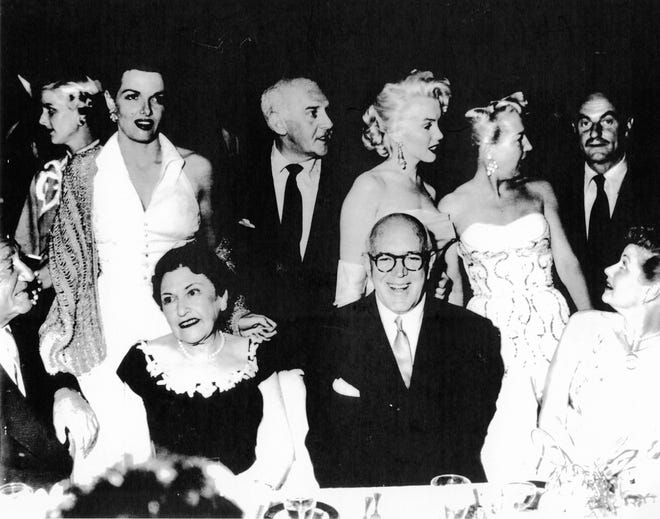
Greatest of gossip columnists graced the desert scene

The caption read, “Lovely Grace Kelly, who may soon become a Princess, receives an invitation from Jimmy McHugh to attend the Golden Nugget Ball at the Tennis Club on Saturday night, and the Marusia fashion show luncheon. Both are benefits for the Women’s Auxiliary of the Palm Springs Desert Hospital. Marusia has designed 10 gowns for Miss Kelly, which will be shown for the first time at the luncheon.”
The picture above the caption was snapped in January 1956 and showed a smiling and dapper Jimmy McHugh, bespectacled, and Miss Kelly, wearing short white gloves matching cuffs and collar, with a smart ribbon tied at the neck, and a big smile.
But it wasn’t usually Grace Kelly, or any other starlet that Jimmy McHugh was escorting in public. In the story accompanying the picture, there was a short sentence stating that Jimmy McHugh and Louella Parsons had reserved a table for 16 people.
It was just the sort of tidbit that would have appeared in one of Louella’s columns. In polite circles she was known to write a Hollywood movie column. But everyone knew it was all gossip.
On the East Coast, tabloid gossip and embarrassing news stories were synonymous with Walter Winchell, who pioneered the no-holds-barred approach to reporting illicit behavior, trysts, peccadillos and all manner of compromising behavior about important people. His columns were peppered with jazz slang and off-color jokes and delivered in blistering staccato when read on the radio.
On the West Coast though, gossip was the purview of Louella Parsons. Having maneuvered herself into a contract with publisher William Randolph Hearst by writing endearingly about his paramour Marion Davies, Louella had been sent to California by Hearst because the movies were in Hollywood, and people were interested in movie stars. She also likely moved west in an attempt to convalesce after having contracted tuberculosis and may have originally come to the desert for treatment.
By 1951, Louella was the queen of Hollywood gossip. She was syndicated in some 400 papers read around the world by millions of people. Less nasty than Winchell, she was no less feared, as a wrong word from her could positively wreck a movie career.
Despite three of her own marriages, which she somehow erased from general consciousness, by 1951, Louella and Jimmy were definitely keeping company. The newspapers were littered with sightings of them together, especially in Palm Springs.

Jimmy McHugh was Broadway and Hollywood royalty. He grew up in Boston and was soon plugging songs for Irving Berlin’s publishing company, then moved to New York where he wrote songs for the Cotton Club revues in Harlem where he met schoolteacher and poet Dorothy Fields.
Together with Fields, McHugh produced some of the biggest hit songs of the century, including “I’m In the Mood For Love” and “On the Sunnyside of the Street.” Soon, he was drafted by Hollywood and wrote scores and songs for multiple studios and dozens of movies.
His tunes were recorded by the biggest singing stars including Bing Crosby, Frank Sinatra, Dean Martin, Judy Garland, Chet Baker, Louis Armstrong and Billie Holiday. His melodies were memorable and appealed to jazz musicians for their particular lovely lines, making for excellent instrumental solos.
All that success lead McHugh to form a charity, at first to fight polio and then for other causes. In that capacity, Jimmy McHugh Charities produced countless events to benefit good causes, including the Golden Nugget Ball in Palm Springs, where he and Louella naturally hosted a table for 16. Louella was the undisputed queen of the ball in Palm Springs.
But in Los Angeles, Louella had a rival: Hedda Hopper. Hopper had 120 movies to her credit, and when her acting career dimmed, she recreated herself as a gossip columnist. She became syndicated nationally and between the she and Louella, they had an estimated 75 million readers, some half of the country, hanging on their every nasty word.
Hopper could not type, or spell very well, often dictating her column to a typist over the phone. In competition with Parsons, Hopper used her extensive contacts to gather material, sometimes paying for information and sometimes with blackmail specifically withholding from print stories in recompense for juicy dish. Hopper hit the national stage by divulging that President Franklin Roosevelt’s son was divorcing his wife after being caught in an affair with a nurse at the Mayo Clinic. Her legacy is that of promoting the blacklist and allying herself with Joseph McCarthy.
All movie stars had a “moral turpitude” clause in their contracts and the studio bosses used the threat of a well-placed tip to Louella or Hedda to ensure proper behavior. Hopper was aware of the fear she engendered and even christened her Beverly Hills home the “House That Fear Built.”
The rivalry between the two women was epic. Amy Fine Collins, in a Vanity Fair article in 1997, wrote, “In their quest for column mentions, a commodity worth its space in gold, studio heads, publicists, and stars had long been playing the dangerous game of pitting one woman tooth and nail against the other.”

A staged rapprochement between the two at Romanoff’s was the stuff of legend. Peace didn’t last,“ Louella surmised, ‘so many people say we do not’ like one another. ‘Who are we to argue against such an enthusiastic majority opinion?’”
Being late to the desert party, Hopper wrote for her column entitled “Filmland Expatriots (sic) Just Adore Palm Springs,” in March of 1964, “So many of my friends have left their palatial Bel Aire (sic) and Beverly mansion to take up residence in Palm Springs, I had to see what magic had lured them away. I hadn’t been there in years, so my visit was an eye-opener.”
Surely Hopper found Louella Parsons out on the town in Palm Springs with Jimmy McHugh, but thought better of mentioning it in print.
